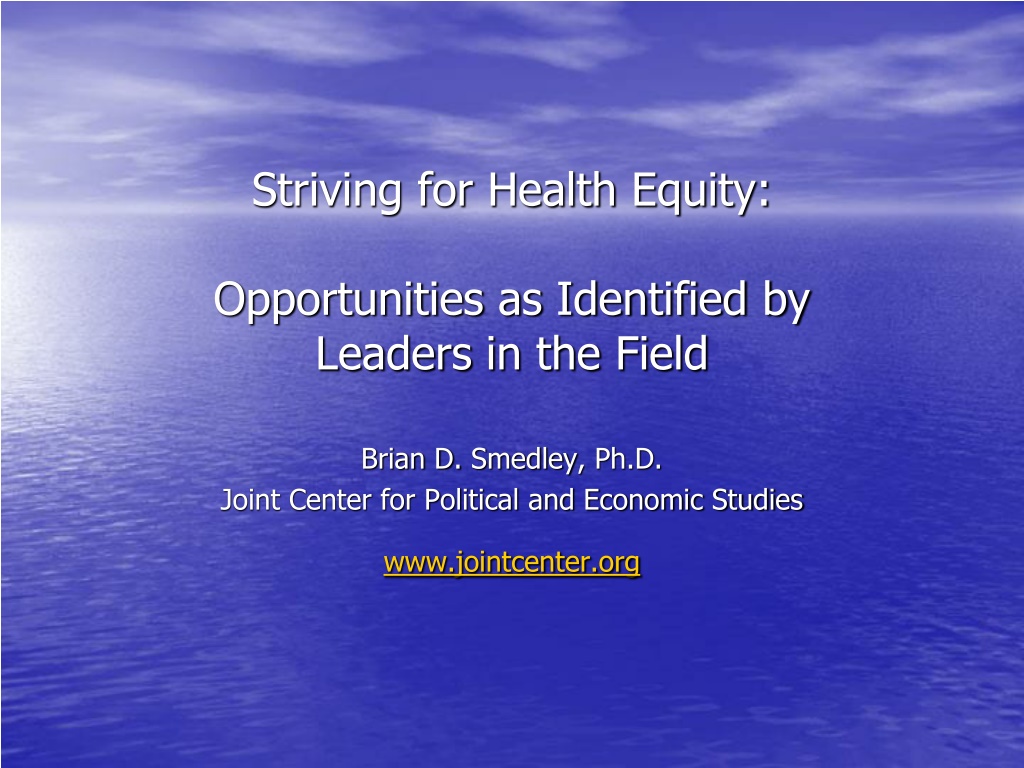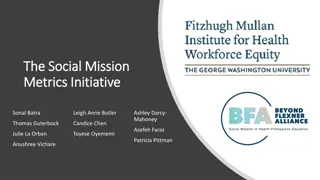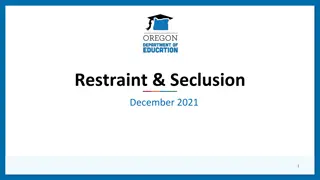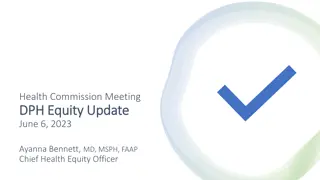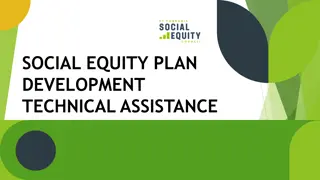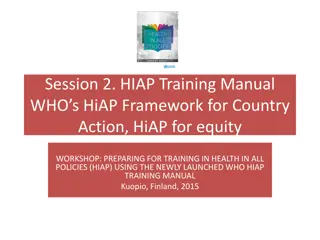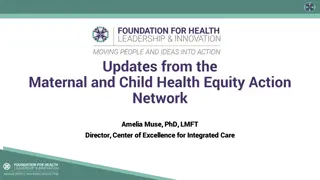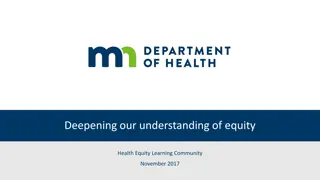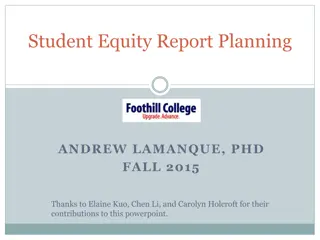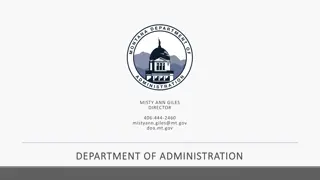Advancing Health Equity: Challenges and Opportunities for Funders
The discussion revolves around opportunities for health funders to promote health equity in the 21st century. Leaders in the field identify key challenges, such as addressing disparities and promoting health equity, and highlight strategies for funders to scale successful practices. The initiative, supported by Grantmakers In Health, aims to offer recommendations and actionable steps for funders to support health disparities reduction efforts.
Download Presentation

Please find below an Image/Link to download the presentation.
The content on the website is provided AS IS for your information and personal use only. It may not be sold, licensed, or shared on other websites without obtaining consent from the author. Download presentation by click this link. If you encounter any issues during the download, it is possible that the publisher has removed the file from their server.
E N D
Presentation Transcript
Striving for Health Equity: Opportunities as Identified by Leaders in the Field Brian D. Smedley, Ph.D. Joint Center for Political and Economic Studies www.jointcenter.org
The Context The second decade of the 21stCentury presents many challenges and opportunities for health funders seeking to advance health equity. Given this landscape, what can health funders do to promote health equity? What are among the key challenges and opportunities? How can funders harness what is already known about successful practices and bring them to scale to benefit larger populations?
The Context At its March 2011 annual meeting, Grantmakers In Health (GIH) convened the inaugural gathering of the National Alliance for Health Equity (NAHE), a funder collaborative focused on issues related to addressing disparities and promoting health equity. NAHE was designed to create a learning community in which funders would explore emerging strategies and engage in frank discussion regarding challenges faced in their work. Striving for Health Equity: Opportunities as Identified by Leaders in the Field would not have been possible without the generous support of GIH Funding Partners: the Aetna Foundation and the Missouri Foundation for Health.
The Charge Highlight the state of play in the health disparities arena; Identify key opportunities for reduction/elimination strategies, including areas of opportunity arising from key health reform provisions; and Offer a set of recommendations and a menu of options for funders considering taking more actionable steps to support health disparities elimination/reduction efforts.
The Leaders Dolores Acevedo-Garcia, Northeastern University Karen Anderson, Institute of Medicine Paula Braveman, UCSF Anthony Iton, The California Endowment Cara James, Kaiser Family Foundation Camara Jones, CDC Ichiro Kawachi, Harvard School of Public Health James Kimmey, Missouri Health Foundation Thomas LaVeist, Johns Hopkins School of Public Health Marsha Lillie-Blanton, CMS Gary Nelson, Georgia Health Foundation Mildred Thompson, PolicyLink David Williams, Harvard School of Public Health
Striving for Health Equity Leading challenges and opportunities for health foundations seeking to advance health equity. Definitions for key terms that are increasing being used by health funders and practitioners, with the goal of seeking conceptual clarity. Health equity framework to identify intervention points and places them in the context of an array of health determinants. Key themes and recommendations from leaders interviewed for this paper.
Challenges and Opportunities Economic downturn has likely made health inequities worse Limited public resources Political gridlock Affordable Care Act US DHHS National Stakeholder Strategy for Achieving Health Equity and Action Plan to Reduce Health Disparities
Suggestions for Methods and Strategies Several suggestions for methods and strategies ways of doing the work emerged from the interviews. These suggestions cut across specific policy and program areas and draw upon examples of exemplary work. Leveraging Public-Private Partnerships Funders look for opportunities to broker public-private partnerships which can strengthen investments toward equity (e.g., government and philanthropic organizations can offer incentives to businesses and private investors to increase access to healthy products and services). Reach Outside of the Health Sector Health funders should partner with organizations working to affect change in other sectors such as education, housing, transportation, criminal justice, etc.
Suggestions for Methods and Strategies Foundation Self-Assessment Foundations engaged in or planning to engage in health equity work should conduct a rigorous equity self- assessment, and to continually monitor the impacts of grantmaking from an equity perspective. Build Upon Successes Health funders have developed many successful programs that have removed barriers to high-quality health care for many underserved populations. Lessons learned from these successful efforts can be applied in the work to address social and economic determinants of health.
Suggestions for Methods and Strategies Communications Interviewees expressed frustration with the lack of communications tools and strategies to advance health equity. In particular, interviewees noted, strategies need to address the challenges of race and racism head on. Democratic Participation Many of the core themes above fundamentally depend upon active civic participation. Twenty-first century public health practice needs to be muscular, optimizing democratic participation and facilitating the ability of parents to fight for their children.
Key Program Opportunities Data Collection Healthcare and Public Health Workforce Behavioral Economics Early Childhood Interventions Place-Based Investments Housing Mobility
Data collection Train staff at the front lines of data collection, educate patients to help them understand how data are used, and support research projects that help understand how, when and under what circumstances health and healthcare disparities exist. Support research and evaluation efforts to understand how different communities benefit from ACA insurance expansions. Develop metrics to assess progress toward health equity.
Key Program Opportunities Health and Public Health Workforce Assess how a range of health workers, including paraprofessionals, are meeting community needs and fund demonstration or seed projects to fill gaps. Behavioral Economics Support and evaluate demonstration programs, and, where successful, encourage efforts to bring them to scale. Evaluate and monitor behavioral economics initiatives to determine their impact on health equity
Key Program Opportunities Early childhood educational intervention/ enrichment. Collaborate with other funders and partners to support expansion and enrollment of eligible children in early childhood intervention and enrichment programs, and promote program fidelity so that such programs provide consistently high- quality services. Place-based investments Support initiatives that reduce exposure to health risks and increase access to health-enhancing resources at the community level. Housing mobility Support housing mobility demonstrations and work to ensure that the public health community is more aware of and in partnership with housing mobility efforts.
Conclusion Despite the many challenges to advance health equity, opportunities abound!
